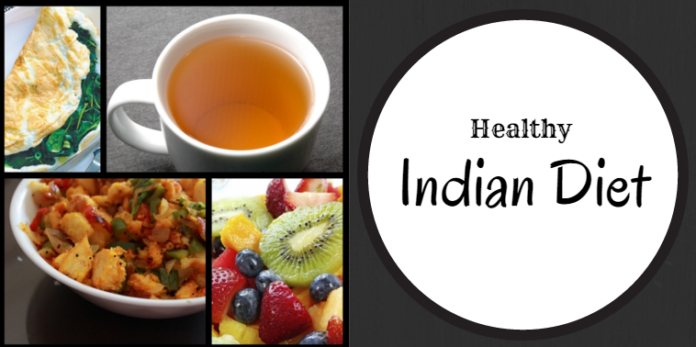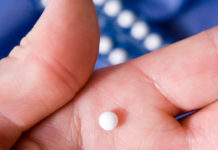The Indian diet plan for weight loss should be designed keeping in mind the calorie requirements of an individual. The calorie requirement of a person is based on factors like age, weight, gender, health conditions, metabolism and activity levels.
Advantages of Indian/ Vegetarian Diet Plan:
A healthy and nutritious diet goes a long way in maintaining the overall health. Some benefits of the vegetarian diet include:
- The practice of eating fruits and vegetables will help to boost the metabolic rate.
- You can lose around 5 to 8 kilograms in 10 days.
- The vegetarian diet plan will give a natural glow to the skin. It eliminates the toxins from our body, making us feel more energetic.
- A vegetarian diet plan will also help in reducing the flab around our body.
- Following a vegetarian diet helps to lower the cholesterol levels. Vegetarian diet is devoid of saturated and trans fat. It reduces high blood pressure, thereby preventing hypertension.
Weight Loss Foods:
The Indian diet plan for weight loss does not require any special ingredients. You can find most of the low calorie and fat burning foods in your kitchen itself. These weight loss foods can also be easily found in the nearest grocery store and can help you lose weight by just cooking them in the right method. These weight loss foods can be eaten directly or in conjunction with other low calorie foods.
1. Moong dal or red lentils:
Moong dal is a favorite of almost every Indian. The dal comes packed with vitamin A, B, C and E, besides minerals like iron, potassium and calcium. This weight loss food is full of fiber, hence people feel fuller after having just a small bowl of this dal. Moong dal is also beneficial for boosting the metabolism and the immune system, thereby protecting the body from fatal diseases. The dal goes best with rice and chapattis.
2. Walnuts:
According to a research conducted in the University of Scranton, walnut ranks above almonds, pecan, pistachio and other nuts in helping one loose weight. A handful of walnut provides twice as much antioxidant than any other nuts. Walnuts are quite high in calories and must be eaten in moderation.
3. Green leafy vegetables:
These vegetables are a storehouse of vitamins, minerals, protein, fiber and phytonutrients. Green leafy vegetables include broccoli, spinach, kale, chard, parsley. spinach is a low calorie vegetable, high in water content, antioxidants, vitamins, minerals and fiber. Being rich in fiber, Spinach helps to cure constipation by cleansing the digestive tract. Just one serving of spinach will keep you feel full until your next meal.
4. Beetroot:
According to several studies, drinking beet juice gives an instant energy boost, allowing you to exercise longer and burn more calories. Beet detoxifies the blood and renews it with minerals and glucose. The vegetable is also high in potassium, folic acid and fiber. The high fiber content in this vegetable eliminates the toxins from the body. Not just the vegetables, beet leaves are also high in minerals and vitamins.
5. Almonds:
Blood sugar level changes also cause the body to make insulin, leading to the deposition of abdominal fats. A study at the University of Toronto found that people who ate almonds with white bread experienced stable blood sugar levels. This weight loss food is also rich in nutrients like monounsaturated fats, folic acid, vitamin E and dietary fiber. Carry a small packet of unsalted almonds for a quick on-the-go snack.
6. Apples:
An apple a day not just keeps the doctor away, but also makes you slimmer. Apple is one of the best weight loss foods. A study at the Penn State University has found that people who ate an apple before every meal, consumed fewer calories than those who had a different snack. The 4 grams of fiber in apple keeps you full for a longer duration as the body takes a lot of time to break it down. You can use apples in salads, desserts and savory dishes too.
7. Black Beans:
Black beans are one of the greatest weight loss foods. According to a data published in the National Health and Nutrition Examination survey, bean eaters weigh less and have slimmer waistlines. Black beans stay for a longer time in the digestive system, adding to the feeling of fullness and satiety. This aids in weight loss. They also contain soluble, non-soluble fiber and resistant starch, a type of fat burning carbohydrate. The abundance of soluble fiber also lowers the cholesterol and triglyceride levels.
8. Cauliflower:
This beautiful vegetable contains several phytochemicals that can fight off the toxic compounds in the body. The presence of thiocyanates, glucosinolates and indoles in this vegetable flushes out toxic waste from the body. Cauliflower is low in calories too. This versatile food will make a great replacement for heavy foods.
9. Cinnamon:
A half teaspoon of cinnamon every day can help you control the blood sugar and prevent insulin spikes. As mentioned earlier, insulin spikes can trigger the body to store fat rather than burning it. The spice also promotes effective blood circulation, helping you get fitter faster. Add ground cinnamon in your cake dough, or tea and coffee to make the most out of this spice.
10. Turmeric:
This Indian kitchen favorite spice is excellent for weight loss. Curcumin, a phenol found in turmeric prevents the deposition of fat in the body. Adding turmeric to the daily diet can help one lose weight in the long run. This weight loss spice is also effective in soothing gastric inflammation and ulcer.
11. Radish:
Cooked radish contains 3 grams of fiber per half cup that can help you stay full and satisfied. This starchy vegetable should not be eaten with rice or bread. Enjoy radish with tomato and cucumber salad.
12. Garlic:
This popular herb is used widely in almost all recipes and gravies. Garlic is an appetite controller, making it perfect for healthy weight loss. According to a study, obese people who ate this zero calorie spice lost an average of 30 pounds in 6 months. Allicin a compound present in garlic is effective for fighting cholesterol and keeping the blood sugar levels stable. It also fights cancer, cardiovascular diseases and respiratory problems.
13. Lentils:
Lentils are the most popular ingredient in any Indian household. It is one of the best belly flattener foods. It prevents insulin spikes that can cause the body to create excess fat in the abdominal area. It reduces the possibility of a heart attack, stabilizes blood sugar and helps in weight loss. For Vegetarians it is a good source of protein.
14. Bananas:
Banana is an excellent fruit to include in a weight loss diet. To lose weight you have to create a caloric deficit. You have to eat more calories than what you can consume in a day. Banana offers healthy carbohydrates that provide more energy to stay active. The high amounts of fiber in bananas help to control appetite in people trying to lose weight. Potassium in bananas can also help to lower blood pressure. Banana contains tryptophan, a chemical that helps to reduce depression. This prevents people from indulging in comfort eating. Best time to eat this fruit is breakfast.
15. Tomatoes:
Tomato, technically a fruit, goes well with every Indian recipe. The body releases a hormone called cholecystokinin every time you eat tomatoes, which tightens the valve between the stomach and intestine. The hormone boosts the feeling of fullness, preventing overeating. This low calorie food stabilizes blood sugar and reduces cholesterol.
16. Olive oil:
Olive oil contains healthy, monounsaturated fat that improves satiety and keeps you from eating junk food. Polyphenols in olive oil detoxify the unbalanced molecules, strengthening the immune system. Add olive oil to your green salad to increase its antioxidant content.
17. Cabbage:
Cabbage is an excellent weight loss food. The food is low in calories and high in fiber. This weight loss food is an excellent source of vitamin C. It is ideal for constipation, aging, stomach ulcer and skin disorder as well.
18. Coffee:
Caffeine in coffee can raise the metabolic rate by 15%. This can burn around 30 to 50 calories per day. People who sip 3 to 4 cups of coffee are 30% less likely to get type 2 diabetes.
19. Pears:
Pears are one of the most fiber rich fruits. A medium sized pear provides 5.5 grams of fiber. Eating a single serving of this fruit can keep you satisfied for a long time.
20. Seeds:
Seeds are a rich source of fiber, protein, vitamins, minerals and omega 3 fatty acids. Seeds like flax seeds, peanuts, sunflower seeds and pumpkin seeds keep the heart healthy by reducing cholesterol and increasing high-density lipoprotein in the blood. It also strengthens the functioning of bones and brain.
21. Cereals and whole grains:
Cereal and whole grains have ample nutritional value. They are a great source of zinc, iron and several important minerals.
7 Days Diet Plan for Weight Loss:
A vegetarian diet plan for weight loss should provide all the essential nutrients to satisfy the hunger pangs, while being low in calories. When preparing an Indian diet chart, you have to be careful regarding it’s fat and carbohydrate content. Here is a sample diet plan to help you in your weight loss journey:
Day 1
Early morning: 7 am
- 1 glass of warm water with honey
Breakfast: 8 am
- 1 bowl of low fat milk with whole grain cereals
- A serving of fruit
Lunch: 1 pm
- 1 bowl of brown rice
- 1 bowl of red kidney beans
- 1 bowl of green salad
Evening snack- 4 pm
- Sprouts salad with lemon juice, onions, tomato, salt and pepper
Dinner: 8 pm
- 1 bowl of soya curry with 2 chapattis
- 1 small bowl of cucumber and tomato salad
Day 2
Early morning: 7 am
- Green tea without sugar
Breakfast: 8 am
- 1 bowl of poha
- A small glass of soy milk
Lunch: 1 pm
- 2 chapattis with 1 small bowl of mixed vegetables
- 1 small bowl of curd with berries
Evening snack: 4 pm
- A handful of nuts like almonds, walnuts and pistachio
Dinner: 8 pm
- A bowl of khichdi
- 1 small bowl of sprout salad
Day 3
Early morning: 7 am
- Methi seeds in water. Soak 1 teaspoon of methi seeds in water overnight. Strain the methi seed and drink the water.
Breakfast: 8 am
- 2 slices of brown bread with margarine
- A fruit of your choice
Lunch: 1 pm
- A small bowl of salad
- 2 bran chapatti with 1 bowl of dal
Evening snack: 4 pm
- 1 bowl of popcorn (do not add butter, cheese or any other toppings)
Dinner: 8 pm
- 1 small bowl of palak paneer
- 1 bowl of rice
- 1 chapatti
Day 4
Early morning: 7 am
Neem water (Soak a few leaves of neem leaves in water and leave it over night. Strain and drink the water in the morning.)
Breakfast: 8 am
- 2 slices of hung curd sandwich
- 1 medium sized banana
Lunch: 1 pm
- 1 small bowl of kadhi
- A small bowl of rice
Evening snack: 4 pm
- Tea with biscuits
Dinner: 8 pm
- 2 bran chapattis with 1 small bowl of chole
- 1 small bowl of lettuce salad
Day 5
Early morning: 7 am
- 1 glass of lemon water
Breakfast: 8 am
- 2 eggs stuffed omelet with 2 slices of brown bread
- 1 cup of green tea
Lunch: 1 pm
- 1 bowl of vegetable khichdi
- 1 small bowl of cucumber and tomato salad
Evening snack: 4 pm
- A cup of fresh yogurt with half a cup of berries
- 1 tablespoon of flax seeds
Dinner: 8 pm
- 1 cup of homemade tomato soup with 1 cup of stir-fried vegetables
Day 6:
Early morning: 7 am
- 1 glass of warm water with honey
Breakfast: 8 am
- 1 bowl of oatmeal with skimmed milk
- 1 orange
Lunch: 1 pm
- 2 whole wheat chapatti
- 1 small bowl of okra sabzi
- 1 bowl of dal
- 1 bowl of green salad
Evening snack: 4 pm
- A bowl of fruit salad
Dinner: 8 pm
- 1 bowl of bean sprouts
- 1 bowl of vegetable fried rice
Day 7
Early morning: 7 am
- A cup of unsweetened green tea
Breakfast: 8 am
- 2 slices of cucumber sandwich
- 1 glass of butter milk
Lunch: 1 pm
- 1 bowl of dal with steamed rice
- 1 bowl of mixed green salad
Evening snack: 4 pm
- 1 glass of yogurt smoothie
- A handful of puffed rice
Dinner: 8 pm
- 1 cup of egg curry
- 2 chapattis
7 Days South Indian Diet Plan for Weight Loss:
Day 1
Early morning: 7 am
- 1 glass of warm lemon water
Breakfast: 8 am
- 1 neer dosa with tomato chutney
- 1 cup of tea with 2 cracker biscuits
Lunch: 1 pm
- 1 bowl of Sāmbhar with steamed rice
Evening snack: 4 pm
- Fruit salad
- Green tea without sugar
Dinner: 8 pm
- 2 Chapattis with a small bowl of bhendekai gojju
- 1 small bowl of curd
Day 2
Early morning: 7 am
- A glass of warm water with honey
Breakfast: 8 am
- Oats dosa with chutney
- 1 glass of butter milk
Lunch: 1 pm
- Corn Meal Khichdi
- 1 Bowl of green salad with olive oil dressing
Evening snack: 4 pm
- A handful of nuts
Dinner: 8 pm
- Pachai Payaru (Green Gram) Kuzhambu
- A small bowl of Kovakkai (Tindora) Rice
Day 3
Early morning: 7 am
- Green tea without sugar
Breakfast: 8 am
- 1 glass of ragi ganji
- 2 idlis with chutney
Lunch: 1 pm
- 2 ragi ball with 1 bowl of cabbage palya
- 1 bowl of bus saaru
Evening snack: 4 pm
- 2 wheat rusk
- 1 cup filter coffee
Dinner: 8 pm
- 1 bowl of Andhra Dal Masiyal with 2 chapattis
- A bowl of sprout salad
Day 4
Early morning: 7 am
- Green tea without sugar
Breakfast: 8 am
- Tomato upma
- 1 serving of fruit
Lunch: 1 pm
- 1 small bowl of Okra Tamarind Pachadi
- A bowl of steamed rice
Evening snack: 4 pm
- Ragi pancake with tomato chutney
Dinner: 8 pm
- Cauliflower kootu with 2 bran chapattis
- 1 small bowl of curd
Day 5
Early morning: 7 am
- A glass of lemon water
Breakfast: 8 am
- Vegetable Oats Idli with green chutney
- 1 glass of coconut water
Lunch: 1 pm
- A bowl of Keerai Paruppu (Dhal) Masiyal
- 1 bowl of brown rice
Evening snack: 4 pm
- 2 appam (use coconut in moderation)
Dinner: 8 pm
- 1 bowl of Broccoli Poriyal
- 1 bowl of steamed rice
- 1 small bowl of curd
Day 6
Early morning: 7 am
- 1 glass of coconut water
Breakfast: 8 am
- Pessaruttu with green chutney
Lunch: 1 pm
- Mixed vegetable kootu with brown rice
- Tomato and cucumber salad
Evening snack: 4 pm
- A bowl of Sprouted Moong Kanji (Porridge)
Dinner: 8 pm
- 1 bowl of rasam with lentil pancakes
- 1 bowl of curd
Day 7
Early morning: 7 am
- 1 glass of methi water
Breakfast: 8 am
- Adai Dosa with chutney
- 1 fruit of your choice
Lunch: 1 pm
- One bowl of koshimbiri with curry leaves rice
- A cup of green salad
Evening snack: 4 pm
- 1 small bowl of sevai
Dinner: 8 pm
- Egg dosa with chutney
- A small bowl of rainbow raita
Alcohol:
Alcohol increases uric acid in the body, leading to water retention. This blocks the process of natural detoxification. Hence, alcohol is prohibited while following this diet.
Water:
It is very essential to drink 10 glasses of water daily. Carbohydrate intake is limited while following this diet, so water will be your main source of energy. Water will boost metabolism, removing unwanted fat from the body.
This is a generalized sample diet chart for weight loss. It may not suit everyone. For best results, consult your dietician for a more personalized diet plan.



















































